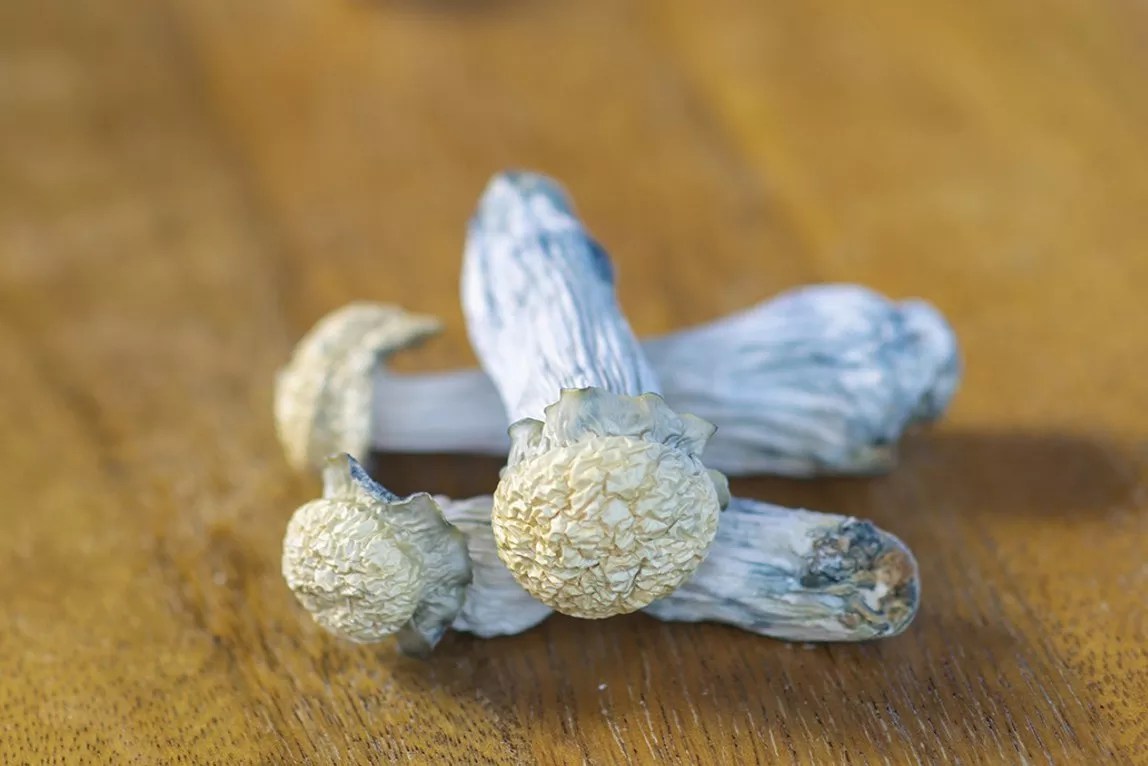
Evan Semón

Audio By Carbonatix
The Colorado Legislature’s first magic mushroom bill hearing started April 20 at 4:20 p.m., and lasted all of four hours and 21 minutes.
Missed it by a minute.
The similarities between marijuana and psychedelics legalization in Colorado are thick, from funny coincidences to serious political conversations, but one aspect of psychedelics that won’t be following marijuana’s lead is full local control – for now, at least.
The state Senate passed a bill addressing Proposition 122, the initiative approved by voters in November that decriminalized and legalized certain psychedelics in Colorado, on April 25, clearing the measure’s path to the state House of Representatives. Also known as the Natural Medicine Health Act, Prop 122 legalized therapeutic psilocybin and decriminalized the personal cultivation, use and sharing of psilocybin as well as DMT, ibogaine and mescaline (not from peyote) for people 21 and older, with the last three up for review for potential medical legalization in 2026.
Approved by just under 54 percent of Colorado voters, Prop 122 left the majority of the psychedelic framework to the state Department of Regulatory Agencies, which is currently overseeing a Natural Medicine Advisory Board, and the Colorado Legislature. The legislature’s 91-page bill, introduced by Senate President Stephen Fenberg, largely addresses personal rights and laws surrounding the secondhand facilitation of psychedelics.
Fenberg’s bill proposes guardrails for unlicensed psychedelic facilitators, restrictions for personal mushroom and natural-medicine cultivation, and criminal penalties for the unlicensed sale or distribution of psychedelics. The state Department of Revenue, responsible for overseeing Colorado’s liquor, marijuana and gaming industries, among others, would be charged with regulating licensed psychedelic manufacturing, distribution, testing and other business activities.
What Fenberg’s proposal doesn’t include is a stipulation allowing local governments to ban psychedelic healing centers, which are scheduled to open for psilocybin therapy by late 2024 or early 2025.
Amendment 64, the voter-approved measure that legalized recreational marijuana in Colorado, gave local governments the right to prohibit any kind of marijuana business, but Prop 122’s language specifically allows the statewide facilitation of psychedelics. Fenberg’s bill gives local governments the right to enact time, place and manner regulations, but since introducing the measure, he’s been steadfast in protecting the statewide approach outlined in Prop 122, despite calls to roll it back from coalitions of towns and counties.
“A lot of our border counties are very nervous. They had a lot of trafficking issues during the early days of legalized marijuana in Colorado,” Colorado Counties, Inc. Executive Director Eric Bergman told a Senate committee on April 20. “This is a bill that needs to pass. We need to be giving our law enforcement community the tools that they need.”
A nonprofit that represents county commissions across the state, CCI has many members who want a local prohibition authority, according to Bergman, who forecasts a world of mushroom dispensaries similar to retail marijuana shops. “We all know where this is going. This is going to be dispensaries. This is going to be grow operations down the road,” he said during the April 20 hearing.
Fenberg, who’s admitted to voting against Prop 122, pushed back at the notion that commercial psychedelics were inevitable, and argued that lawmakers had a responsibility to “respect the intent” of Colorado voters in the early stages of creating a statewide framework.
“This bill and Prop 122 absolutely does not allow that type of a setup,” he told Bergman and his Senate colleagues. “It won’t be some casual setup, where you buy shoes and then pop into a healing center.”
The Senate isn’t united on this front, however. Senator Barb Kirkmeyer introduced two amendments on the Senate floor on April 25 proposing local ban authority on psychedelic healing centers. Kirkmeyer, who said she voted against Fenberg’s bill in committee “because my county voted against it,” also proposed local ban authority on personal psychedelic cultivation, another right that was specifically outlined in Prop 122.
Both of Kirkmeyer’s amendments were voted down, but there were some changes to the bill, including amendments that would loosen restrictions for psilocybin laboratory testing and psychedelic harm reduction providers, and create a state advisory board tasked with preserving the Indigenous use of psychedelics.
The bill’s first hearing in the House will be on Thursday, April 27, before the House Finance Committee. Lobbyists on all sides expect amendment proposals – so the local-control issue, among many other policy matters, isn’t settled yet.